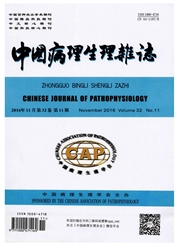

 中文摘要:
中文摘要:
目的观察人补体受体1型功能域SCR1—3(CR1-SCR1—3)对补体介导的脓毒症小鼠炎症损伤的保护作用。方法昆明小鼠150只,随机分为对照组(50只),脓毒症组(50只),CR1-SCR1—3保护组(50只)。采用内毒素腹腔注射致脓毒症模型,各组分别于实验前1h腹腔注射D-氨基半乳糖600mg/kg增敏。对照组腹腔注射等体积PBS;脓毒症腔注射LPS(50μg/kg)+等体积PBS;CR1-SCR1-3保护组注射LPS(50μg/kg)+CR1-SCR1—3(15mg/kg)。各组留10只小鼠,观察实验后72h生存率。其他小鼠在实验后8h测定血清IL-1β含量,12h后取肺组织标本检测髓过氧化物酶(myeloperoxidase,MPO)水平、免疫组织化学检测C4b沉积及观察肺病理学改变。结果脓毒症组的脓毒症反应最强烈,16h后全部死亡,保护组的脓毒症症状减轻,16h后生存率达40%.显著提高(P〈0.05)。脓毒症组的血清促炎症介质IL-1β和肺组织MPO水平均明显升高,保护组的显著降低(P〈0.001)。脓毒症组的肺组织原位C4b沉积明显增多,保护组的明显减少。病理学检查显示.保护组小鼠肺损伤较脓毒症组的明显减轻。结论补体在脓毒症的发生和发展中起重要作用,人CR1-SCR1—3对脓毒症小鼠炎症损伤具有一定的保护作用。
 英文摘要:
英文摘要:
We aim to observe the protective effect of human complement receptor type 1 SCR1-3 (CR1- SCR1-3) against inflammation damage during complement-mediated sepsis in mice. Firstly, 150 clean grade Kunming mice were randomly divided into control group, sepsis group, and CR1-SCR1-3 protective group, with 50 mice in each group. 600 mg/kg D-galactosamine was intraperitoneally injected in lipopolysaccharide sepsis mice 1 h before treatment. The following liquid were injected into the mice in each group as treatment, PBS in control group, LPS(50 μg/kg)+PBS in sepsis group, and LPS (50 μg/kg)+CR1-SCR1-3(15 mg/kg)in CR1-SCR1-3 protection group. Ten mice in each group were used to observe the survival percentage in 72 h. Then, we detect the content of IL-1β in the mice serum 8 h after treatment. Lung was dissected 12 h after treatment to observe pathological changes, the level of myeloperoxidase (MPO), and C4b deposition. We found that the mice in sepsis group were all died in 16 h with typical sepsis reaction. But the sepsis reaction of mice in protective group were apparently alleviated and 40% of mice survived more than 16 h (P〈0.05). Serum cytosine IL-1β and lung MPO levels in sepsis group were greatly increased, however, the level of these two were reduced in protective group (P〈0.001). Pathological examination shows that lung damage of mice in protective group were alleviated compared to sepsis group. All the results show that complement plays a very important role in the development of sepsis. Human complement receptor type 1 SCR 1-3 (CR 1-SCR 1-3) has protective effect against inflammatory injury during sepsis in mice.
 同期刊论文项目
同期刊论文项目
 同项目期刊论文
同项目期刊论文
 期刊信息
期刊信息
